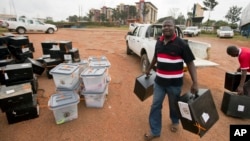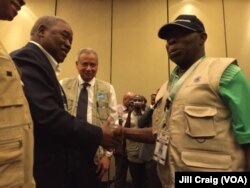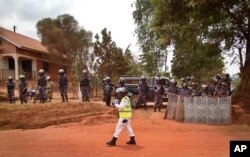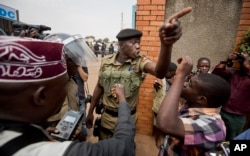New provisional results in Uganda's controversial presidential election show President Yoweri Museveni, in power for 30 years, leading with nearly 62 percent of the vote.
A final tally is expected later Saturday.
The numbers were released a few hours before the (4 p.m. local) deadline for final results, with 83 percent of the votes counted.
Museveni's strongest challenger, Kizza Besigye, had 34 percent of the vote, and Amama Mbabazi had 1.5 percent.
Election criticized
The United States, international observers and a prominent human rights group have criticized Uganda's election process, alleging undue pressure, and in some cases undue force, by security forces on opposition candidates and their supporters.
U.S.-based Human Rights Watch on Saturday expressed concern about Uganda's ability to hold free and fair elections, as well as Ugandans' rights to free expression and assembly.
Maria Burnett, an Africa specialist for the group, said threats to Ugandans' human rights had been documented over the years, but in the days preceding the election, she said, "there was no hiding the brutality."
She called on Ugandan security forces to respect peaceful protests and avoid excessive use of force in response to any confrontations.
Uganda's main opposition leader, Besigye, was arrested for the second time in two days Friday as election results showed him running a distant second in the presidential poll to incumbent Yoweri Museveni.
Witness reports
Witnesses said police took Besigye and other top members of his party, the Forum for Democratic Change, away from their headquarters in Kampala. Police had fired tear gas into the building as party leaders tried to hold a news conference to talk about alleged election fraud by authorities.
Police said Besigye was detained because he planned to announce election results, in violation of electoral laws.
A police spokesman, Fred Enanga, told The Associated Press that Besigye has been taken to his home and said his movements were not restricted.
U.S. Secretary of State John Kerry voiced concern about the detention of Besigye and urged Museveni to rein in his security forces.
'Call into question' results
Kerry spoke on the phone Friday with Museveni, saying the police actions "call into question Uganda's commitment to a transparent and credible election process free from intimidation," the State Department said in a statement.
Kerry also urged Museveni to end the shutdown of popular social media sites and money mobile services. The head of Uganda's Communications Commission said the social media sites were blocked for security reasons.
Another presidential challenger, former prime minister Mbabazi, left his house with a police escort Friday. Earlier, he had released a statement saying police were arresting people outside his residence, and he posted video of officers patrolling the streets.
Besigye alleged that Thursday's election was subject to vote rigging, rendering it "unfree and unfair."
His statement came after police briefly arrested him Thursday when he tried to enter a house he said was being used for the alleged rigging operation. Police said the house was a security facility and that Besigye was arrested for trespassing.
Some polling stations did not open on time Thursday because election materials had not been delivered. The delay frustrated many would-be voters, some of whom spent hours waiting in line in the heat for their chance to cast a ballot.
At one station in Kampala, police fired tear gas to disperse angry voters who had waited seven hours in line, only to find there were no ballots for the poll.
Voting continued Friday in some parts of Kampala and the Wakiso district to make up for Thursday's delays.
About 15 million Ugandans were eligible to vote in these elections for president, parliament and local government seats. Museveni faced a challenge from seven opponents, most prominently Besigye, who has lost to him in three previous elections.
Besigye has accused Museveni and the ruling NRM party of using poll-rigging and intimidation of voters to secure victory in those polls.
VOA reporter James Butty contributed to this report.







